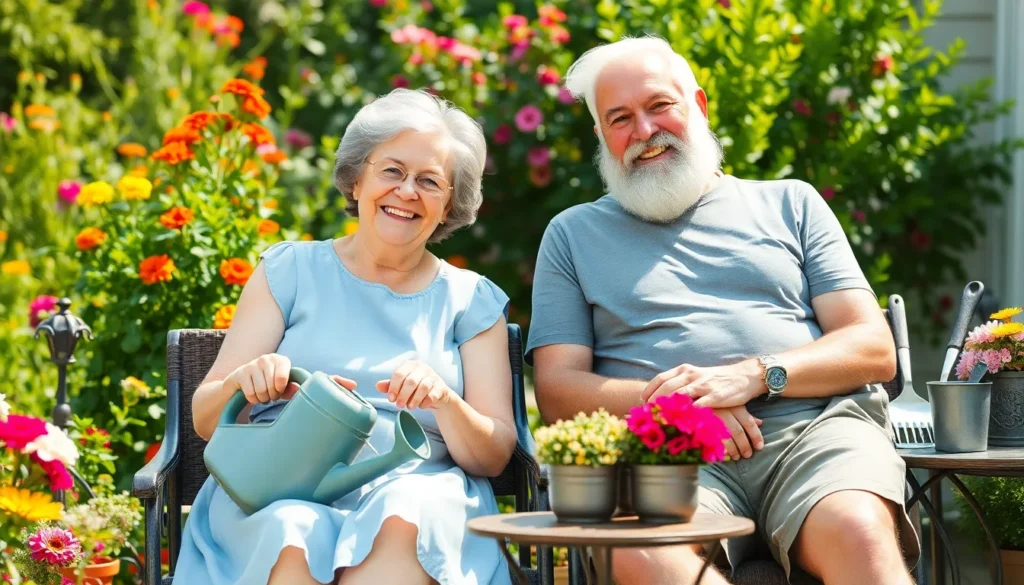Retirement isn’t just about trading in the briefcase for a beach chair; it’s a whole new chapter brimming with possibilities. Imagine waking up without an alarm clock, sipping coffee while plotting your next adventure—whether it’s learning to tango or finally mastering the art of doing absolutely nothing. The retirement lifestyle offers freedom that many can only dream of, and it’s time to embrace it with open arms (and maybe a cocktail).
However, navigating this exciting phase can feel a bit like trying to assemble IKEA furniture without instructions. From finding the perfect hobbies to staying socially active, it’s essential to craft a retirement that’s not just enjoyable but fulfilling. Ready to dive into the world of leisurely pursuits and spontaneous road trips? Let’s explore how to make the most of these golden years while keeping a smile on your face and a twinkle in your eye.
Table of Contents
ToggleUnderstanding Retirement Lifestyle
Retirement lifestyle signifies a transformative phase filled with choices and adjustments. Individuals often find new purposes and opportunities that define this important period.
Defining Retirement Lifestyle
A retirement lifestyle encompasses the daily routines, activities, and social interactions adopted by individuals after their career ends. Choices vary widely, with some opting for travel, while others pursue hobbies like gardening or volunteering. Lifelong learning also becomes a priority, as many seek new knowledge through classes or workshops. Social connections take center stage, enhancing quality of life and providing emotional support. Furthermore, creating a balanced lifestyle involves integrating leisure, relationships, and personal interests, ultimately ensuring fulfillment after leaving the workforce.
Importance of Planning
Planning plays a critical role in shaping a successful retirement lifestyle. Financial stability serves as a foundation, allowing individuals to explore various options without stress. Setting clear goals helps define desired activities and experiences, guiding proactive steps toward fulfilling retirement. Additionally, anticipating challenges, such as healthcare needs or changes in living arrangements, enables smoother transitions. Identifying hobbies and interests early on empowers people to engage in meaningful pursuits. Effective planning lays the groundwork for an enriching and enjoyable retirement experience, ensuring individuals make the most of their golden years.
Key Aspects of Retirement Lifestyle

Retirement lifestyle revolves around creating a fulfilling and balanced routine. Individuals navigate various aspects, including financial security, social connections, and health and wellness.
Financial Security
Financial security plays a critical role in retirement lifestyle. Adequate savings ensure individuals meet their needs comfortably. Many retirees rely on pensions, savings accounts, and Social Security benefits to maintain their lifestyle. Creating a budget helps manage expenses effectively. Understanding healthcare costs also becomes essential, as retirees face potential medical bills. Investments in stocks, bonds, or real estate may provide additional income streams. Planning for inflation enables retirees to adjust their financial strategy over time. Seeking professional advice can optimize financial decisions and enhance overall security.
Social Connections
Social connections enrich retirement experiences significantly. Maintaining relationships fosters emotional well-being and combats loneliness. Engaging with friends and family encourages participation in activities and events. Volunteering or joining clubs provides opportunities to meet like-minded individuals. Community engagement remains essential, with many retirees exploring new hobbies or interests. Attending local classes or workshops can also stimulate social interactions. As friendships strengthen, they contribute to a more satisfying and balanced retirement lifestyle. Building a support system enhances resilience during challenging times.
Health and Wellness
Health and wellness are foundational to a rewarding retirement lifestyle. Prioritizing physical activity helps maintain strength and flexibility. Regular exercise routines, such as walking, swimming, or yoga, support overall well-being. Nutrition plays an equally important role; a balanced diet can improve energy levels and mood. Routine health check-ups ensure early detection of potential issues. Mental wellness should not be overlooked; mindfulness practices and hobbies stimulate cognitive function. Social activities and engagement promote mental health. Focusing on both physical and mental health lays the groundwork for an enjoyable retirement.
Activities to Enhance Retirement Lifestyle
Engaging in meaningful activities significantly enhances the retirement lifestyle. Various interests and pursuits contribute to personal satisfaction and social connections.
Volunteering and Community Involvement
Engaging in volunteering presents opportunities to make a difference while connecting with others. Many retirees find fulfillment in supporting local charities and organizations. Joining community events fosters relationships and promotes social engagement. Participation in volunteer work not only helps individuals adjust to retirement but also provides a sense of purpose. Regular involvement can lead to new friendships and networking opportunities.
Hobbies and Interests
Exploring hobbies cultivates passions and provides enjoyment during retirement. Whether it’s gardening, crafting, or painting, these activities encourage creativity and self-expression. Joining a club related to personal interests can enhance social connections and enrich daily life. Many retirees invest time in learning new skills, such as cooking classes or musical instruments. Embracing varied interests keeps life dynamic and engaging.
Travel and Exploration
Traveling offers retirees the chance to explore new cultures and experiences. Many seniors prioritize trips to destinations that spark their curiosity, whether domestic or international. Short excursions or long vacations facilitate adventure and relaxation. Group travel programs cater specifically to retirees, allowing like-minded individuals to connect while discovering new places. Planning these journeys enhances life satisfaction and creates lasting memories.
Challenges in Retirement Lifestyle
Retirement comes with significant challenges that require adaptation and resilience. Managing these changes helps individuals enjoy this new phase of life.
Adjusting to Change
Adapting to retirement often means navigating a shift in daily routines and activities. New schedules replace work commitments, and this transition can create unease. Individuals may struggle with the lack of structure that a job provided. Embracing flexibility, along with planning for fulfilling activities, eases this adjustment. Many retirees find joy in creating new routines that incorporate hobbies, volunteering, and social engagements. Establishing a rhythm promotes a sense of normalcy during this period of change.
Maintaining Purpose and Identity
Retirement can challenge personal identity and purpose for many individuals. Losing the role they held for years may lead to feelings of uncertainty. Engaging in meaningful pursuits fosters a sense of fulfillment. Exploring new hobbies or dedicating time to volunteer work helps reinforce self-worth. Social connections play a vital role, forming new bonds through shared activities. Cultivating relationships with like-minded individuals nourishes mental health, combating loneliness. Establishing new identities in retirement ultimately enhances overall well-being.
Retirement offers a unique opportunity for individuals to redefine their lives and pursue passions that bring joy and fulfillment. By embracing the freedom that comes with this new chapter, retirees can explore diverse activities and foster meaningful connections.
Planning for a secure financial future and prioritizing health and wellness are essential components of a rewarding retirement lifestyle. Adapting to change and finding purpose through hobbies, volunteering, and social engagement can significantly enhance overall well-being.
With the right mindset and preparation, retirement can transform into a vibrant and enriching phase of life, filled with adventure, learning, and lasting friendships. Embracing this journey will lead to a fulfilling and enjoyable experience in the golden years.





